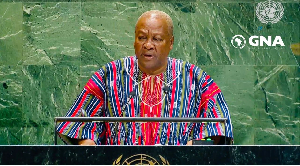Sad but true, the current state of public institutions in Ghana is nothing to write home about. In expressing my deep concern regarding the state of the country’s public institutions and how inappropriate conduct exhibited by some staff working in these public institutions is undermining the principles of transparency, accountability, and good governance, which are necessary for a thriving democracy and a robust economy, leaves much to be desired. Thus, one is tempted to ask if laws regulating the appropriate conduct of public servants in Ghana exist.
Walk the corridors of any public institution and you will be left with no doubt that Ghana’s public sector is somewhat a quasi-political party establishment, a worrying development posing significant threat to the integrity of the service.
Allegations of disturbing issues ranging from secret meetings organized by select senior staff to agree on acceptable modalities for the development and successful implementation of succession plans, an exhibition of gross misconduct by junior staff towards select senior staff, the appointment of junior ranked staff to head units or departments, the appointment of private sector participants to occupy sensitive positions in the service, running of a clique system in the service, breach of privacy, deliberate frustration of senior staff, a take it or leave the public institution kind of offers, the use of none staff for official functions, and the non-adherence to laws regulating conduct in the service, are but a few of the current trends associated with disturbing happenings in the public service.
The presence of these worrying developments, as alleged, compromises the ability of the public servant to function effectively and ethically. These developments if not checked can lead to the potential collapse of the public service.
I am of the strong opinion that public service should serve as a pillar of trust and responsibility in managing the affairs of the State. The presence of these unfortunate developments not only erodes public confidence in public institutions in the country but also hampers the growth and stability of our economy. Considering the functional role of public servants in this country, it is essential to maintain a strong adherence to rules regulating conduct in the service to safeguard the economic well-being of public institutions, public servants, and the economy of Ghana.
Our political party is in power, it is our time to chop and develop, the public service is for us, nobody can tell us what to do, and we have to position ourselves strategically for the good of the political party, let's frustrate individuals not known to our course in the service, etcetera readily comes to mind as few of the worrying developments associated with worrying conduct in the public service.
Ironically, it is alleged that most staff occupying senior or Directorship positions in these public establishments are culprits masterminding and encouraging these unwarranted, illegal, and shameful conducts in public service. Their modus operandi can comfortably be gleaned from their strategic but childish ways of nurturing, encouraging, and incentivizing junior staff to deliberately engage in undermining conduct against selected senior staff.
Paradoxically, the innocent senior staff in the public service against whom all these disgraceful, illegal, and unwarranted attacks are leveled is seen and carefully described by many in the service as irrational, incompetent, and not fit for purpose, underscoring the adage “give a dog a bad name for it to be hanged”.
Today, the best description of the public service in Ghana for me is “an establishment now lost or an avenue for lost generations”. The public service in Ghana as known by its enviable ethos of old, is no more. The public service in this country is comatose. Significant efforts will be required to revive it. The public service is now a political quagmire delivering on the party's political agenda. We have lost it.
A cursory examination conducted by any individual interested in establishing rational reasons underpinning the exodus of skilled staff from the public service will leave with answers not entirely different from the aforementioned issues. Today, the public service in Ghana is fast losing its skilled staff to countries like Liberia, Togo, Benin, Gambia, Sierra Leone, Nigeria, the United States of America, Canada, United Kingdom, Germany, Norway, China, Japan, just to mention but a few.
The service is fast losing its best and brightest. How useless do we want to be in a situation before we take necessary action?
Frustrate them to leave the public service or at best encourage them to leave any day they express their willingness to leave the service. We can always replace them with individuals from our stock of the best and brightest in the country. This, I must say, is the disturbing attitude of some individuals in whom the right to act in the best interest of the public service is reposed.
To these groups of individuals, are they aware that a significant amount of tax money is spent annually on training for individuals in the public service? Are they also aware that this country needs these skilled staff to turn things around? Do they have any form of appreciation of the meaning of the phrase “exodus of skilled staff” from the public service and its impact on the economy of Ghana?
Unashamedly in adding their voices, the public servant is quick to join in choruses of criticism against the government's inability to successfully implement economic policies for the growth of this country. The importance of who the public servant is in this country should not be lost on any individual let alone the public servant. The functional role required to be performed by the public servant and as defined by statute, positions the public servant in a valued, enviable, and advantageous category necessary for policy formulation, implementation, and evaluation.
However, the inability of the public servant to fully comprehend his or her relevance in the public service as defined by statute gives room for the politician to assume the position of a demigod, feared by many public servants and hence allowed to engage in conduct foreign to the service. Must the politician be blamed? The answer is a simple no. To the extent that public servants have reneged on their constitutional and statutory functions, the politicians will do as they please as long as it serves their parochial interest.
Emphasis therefore needs to be laid on the fact that, the politician in Ghana wields no power more than that which is confirmed on him or her by the 1992 constitution of Ghana or any legislative instrument in force in the country. It stands to reason therefore; the politician is not above any law in this country. Equally, public servants are not above the law. They are required to operate within the limits of the law.
Another interesting development undermining the values of public service in Ghana is in respect of the total disregard for the “Ethics or Code of Conduct” of the profession by recruits commonly referred to as “GEN ZEE’s”.
Protecting the image of the service is paramount. As a result, I will not attempt to list some of the worrying things done by this group of newbies. However, for the avoidance of doubt, you are at liberty to take a walk to any of these public institutions, position yourself near the entrance of these public institutions as would a watchman, and take a good look for yourself.
Public servants are consistently reminded that they will be addressed by the general public in the way they dress. More importantly, they are told regularly that they reflect the image of the country in a civil capacity both at home and abroad, as a result, they must engage in appropriate conduct. To guide the public servant concerning these issues, the ethics or code of conduct of the profession was developed. Unfortunately, the majority of these new generation kids do not appreciate let alone understand why there must be a code developed to regulate their conduct in the service.
In light of the above, I call upon relevant authorities to take immediate and decisive action to address issues militating against the smooth functioning of public institutions in the country. Thus. an urgent request for all relevant public institutions legally clothed with the mandate to ensure the proper functioning of state institutions to do the following:
As a short to medium-term measure, they should;
Conduct a thorough investigation: a transparent, independent, impartial, and comprehensive inquiry into allegations of malpractices, abuse of human rights, and an appropriate inquest into these unfortunate aforementioned developments.
Ensure whistleblower protection: For fear of victimization, many staff will not find it necessary to offer relevant information in respect of the subject matter. As a result, there is a need to establish a secure and confidential channel for individuals to report these unfortunate developments in the public service without fear of retaliation. This, if done, will help in the identification and elimination of these worrying developments.
Implement stricter legal consequences: the public service is a rule-based institution. What it means is that; the public service is regulated by law. As a matter of urgency, the laws prohibiting undesirable conduct in the service must be enforced and penalties against individuals caught squarely by these laws must be implemented without fear to serve as a deterrent.
As a long-term measure, they should;
Engage relevant stakeholders in extensive, productive, and useful consultations leading to the development and enactment of a new umbrella law for the public service as defined by Article 190 of the 1992 constitution of Ghana. The new law should address, with lucid clarity, issues concerning pay disparities, conditions of service, general misconduct, politics in the public service, formation of cliques in the service, and protections for public servants among others. Additionally, the new law must have an enhanced punishment regime for categorized offenses.
By taking these proactive steps, I am of the strong opinion that public Institutions in the country shall restore public trust and pave the way for a stronger and more stable Public Service.
Always remember, there is no smoke without fire. Accordingly, the prompt attention of the public services commission, the civil service, CLOGSAG, UTAG, labour unions, parliament, and civil society organizations are needed to address these disturbing allegations. Together, we can create public institutions in this great country that uphold the principles of transparency, fairness, and integrity within the confines of laws in Ghana.
The public service in this country is losing exceptionally skilled staff to the Western world and the private sector of other African countries. The rational reason behind the despondency of skilled staff currently left in the service and the exodus of skilled staff from the service is firmly grounded on the deliberate implementation of carefully designed strategies by some individuals in the service, who because of their affiliation with the ruling political class are frustrating innocent persons in the service.
As a concerned citizen with a vested interest in the proper functioning of public institutions, I must emphasize the importance of honesty and ethical behavior. Advocating for the use of lies, deceit, or replacing truth with falsehoods is against effective principles capable of fostering the growth of any institution.
Senior public officers in the public service have a responsibility to uphold the law regulating the service, maintain a good conscience, and prioritize the proper functioning of institutions of state. Trust, transparency, and accountability are paramount for the proper functioning of institutions. Upholding these principles is crucial for fostering public trust and making informed decisions for the betterment of Ghana.
As a result, it is important to state that the public service abhors party-political activities in the service. To the extent that public servants are required by law to work with the government of the day, any individual or group of persons acting in cahoots without authorization from the service to draw and implement succession plans, forming cliques, and undermining laid down laws and principles governing public intuitions should be named, shamed, ousted from the public service and punished accordingly.
The kind of public service we have today is not the kind our forefathers bequeathed. The kind of public service we have today is not the kind capable of transforming this country. The kind of public service we have today is not the kind the majority of Ghanaians are proud of. It is not the kind many Ghanaians want to work in. Are you proud of and happy with the current state of the public service in Ghana? Certainly, I am not, hence the call for urgent redress.
The kind of public service this country needs is a kind that should be capable of functioning devoid of unnecessary political interference. The public servant must know this, politicians will come and go in conformity with political parties. However, the public service is here to stay. As a result, the public servant, and not the politician, is duty-bound to protect and project public service.
Opinions of Thursday, 5 October 2023
Columnist: Dela kojo Tsikata















